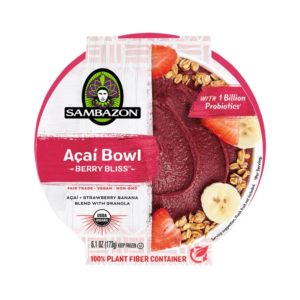Açaí food and beverage brand moves to plant-based packaging
SAMBAZON, a leading global supplier of certified fair-trade and organic Açaí, pledges to achieve plant-based and post-consumer recycled packaging for all U.S. retail products by 2025.
In its inaugural Impact report, the Açaí-based food and beverage brand stated that at the end of 2021, 64% of its U.S. retail packaging was made from post-consumer recycled or plant-based materials. That’s almost double the figure that the certified fair-trade and organic brand reported in 2019.

Açaí, a popular superfood berry from Brazil, retains its nutrient value only for a few hours after it has been picked, which is why it is mostly exported and sold frozen. In 2021, it came in third of all the frozen fruit sold in supermarkets in the U.S., after strawberries and blueberries. Açaí food and beverage products represent a $500M+ industry and are projected to exceed $2B by 2026.
“For years, the frozen food industry has been reliant on plastic packaging for helping prolong shelf life. The frozen Açaí pack must be able to withstand the challenges of sealing, freezing, transportation, and thawing while staying strong and flexible in all conditions,” explained Ryan Black, CEO and co-founder of SAMBAZON. “In 2018, we joined the One Step Closer (OSC) Packaging Collaborative pioneering, testing, and trialing viable plant-based alternatives for the hard-to-replace frozen flexible films.”
Since 2019, SAMBAZON has transitioned their sorbet pints from plastic to paper and fresh juices into post-consumer recycled bottles. In 2020, the brand launched its ready-to-eat bowls with containers made from plant fiber. Changes to packaging helped SAMBAZON avoid using over 360 metric tons of virgin plastic in 2021.







